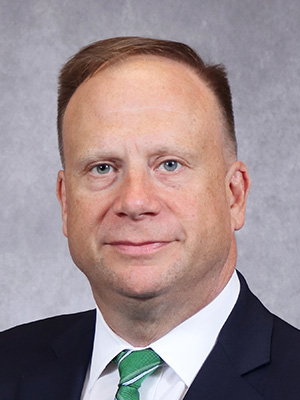Progress and probation
by Mark Largent, vice provost & dean of Undergraduate Education
 I was very happy to see the recent one-pager from our colleagues in Institutional Research that showed the significant progress we have made in reducing the number of students who fall onto probation after their first semester at MSU. Overall, there was a one percentage point drop in the end-of-first-semester probation rate and almost every reported sub-group of students shared in this progress.
I was very happy to see the recent one-pager from our colleagues in Institutional Research that showed the significant progress we have made in reducing the number of students who fall onto probation after their first semester at MSU. Overall, there was a one percentage point drop in the end-of-first-semester probation rate and almost every reported sub-group of students shared in this progress.
At 6.8%, our first-year probation rate is lower than it has been since the pandemic and represents 658 students. Of these, only 75, representing 0.8% of this year’s incoming class of first-time students, were dismissed from the university after their first semester. That is a significant improvement from last year, when 96 students – about 1.0% of the incoming class – were dismissed at the end of their first semesters.
The improvements in first-semester probation rates were well distributed across different sub-groups of students, and for some groups there were large reductions in opportunity gaps. For example, students identifying as African American/Black saw their end-of-first-semester probation rates fall 3.3 percentage points and Pell-receiving students experienced a 3.1 percentage point decrease to 10.0%, which is the lowest since at least 2019.
International students were the only sub-group of students who experienced an increase in their end-of-first semester probation rates. We are looking more closely at why this might have happened. As concerning as this might be given the trends of their peers, I am reminded of the fact that historically international students have had some of the highest success rates in coming off probation. That is, the support we provide international students who are on probation seems particularly effective at bringing them back into good academic standing.
While our students are making good progress on avoiding probation, MSU is likewise making good progress on reforming probation itself. Under the leadership of MSU’s University Innovation Alliance Fellow Maria O’Connell, three workgroups are examining the policies, practices, and procedures associated with ASUS (Academic Standing for Undergraduate Students).
The reforms under consideration by Maria O’Connell and our advising leads and other colleagues in the Academic Standing of Undergraduate Students project, mirror similar efforts at peer institutions, which I learned about at last week’s meeting of Undergraduate Education at Research Universities (UERU) in Washington, DC. Leaders from Purdue University, University of Michigan, University of California - Riverside, and University of California - Irvine described their work to improve probation at their institutions to help better support student success, including
- replacing “probation” with “academic notice;”
- assertively communicating the new terms and their meanings to students and instructors;
- assessing if and how students felt supported and activated by the language and the messaging, rather than fearful;
- changing the barriers to return by making the requirements specific to individual student’s needs;
- celebrating students’ return to good academic standing; and
- asking students who returned to good academic standing to identify the people and the practices that were most helpful to them.
It is exciting to see progress on all these fronts and tremendously rewarding to share a common vision for student success!